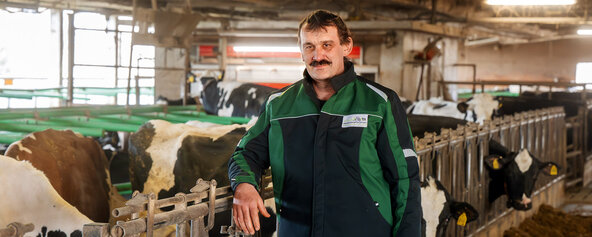
Five questions to Jörg Stottmeister
Why did you decide to take part in the Net Zero Farming project?
Sustainability in agriculture is about focusing on what is to come and as a farm, we want to be fit for the future and stay that way. We were delighted when we were approached about the Net Zero Farming project. We are taking part as climate protection is really close to our hearts and it brings the farm benefits as well.
How far have your expectations for the farm been fulfilled?
The arable farming measures in particular brought some valuable insights and side effects. With low-N maize, we are seeing better nitrogen efficiency. N efficiency means the proportion of nitrogen in the harvested product. We can also use the data from the farm balance sheet in other situations, for example to evaluate the figures in calf rearing.
What surprised you most during the project?
I was surprised that some measures are more cost-effective in terms of efficiency than I had previously thought. Also, analyzing a lot of data made it clear what we weren’t using yet or what we tended to throw away in the past, for example when it comes to the proportion of concentrated feed that ends up in the cow in relation to the amount of feed we actually buy. I also think it’s great that we encounter whole new topics, like biochar, for example, which I wouldn’t have known could be so beneficial throughout the farm.
Which measures seem most promising to you?
There is no single measure that will change everything. It is important to map all your processes and look from the field to the cow when it comes to finding ways to reduce greenhouse gases. In the end, you need a bundle of different measures. You have to bear in mind that we are dealing with animals, though, so naturally they do not always behave according to your plan or expectations. It’s good to stay flexible.
What comes next for your farm in terms of Net Zero Farming?
We want to continue what we started, implementing the measures that work and trying out new ones. Sharing our experiences with the other pilot farms and hearing about what they have learned is very important, so we want to organize more frequent meetings with the other farms involved.
